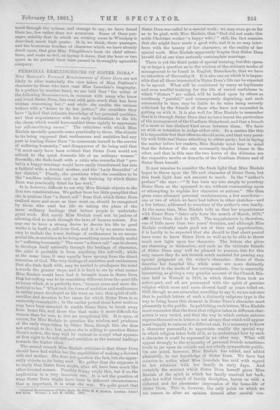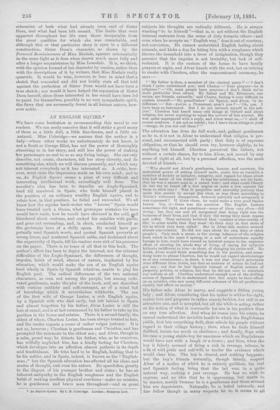she chose, which would have enabled them rightly to appreciate
of the management of the Coatham Sisterhood, and that a breach her self-sacrificing career." The criticisms of a more or less distinct kind arose between them. We have with which Miss Risdale specially quarrels come practically to three. She objects o wish or intention to judge either side. In a matter like this to its being supposed that restlessness and ambition had any bly with little real blame attaching to either party; but in laying part in leading Sister Dora " to consecrate herself to the service the matter before her readers, Miss Risdale must bear in mind of suffering humanity," and disapproves of its being said that " it must early have been evident that Sister Dora would not other, and that in this case the two horns of the dilemma are submit to the quiet domestic life of an ordinary woman."
Secondly, she finds fault with a critic who remarks that " pro- bably a happy marriage would have easily transformed her into a faithful wife, a devoted mother, and the ' Lady Bountiful' of It now remains to consider the fresh light that Miss Risdale her district." Finally, she questions what she considers to be hopes to throw upon the life and character of Sister Dora, but the " needless reflection cast on the training by which Sister this fresh light does not amount to much. In the " author's Dora was practically fitted for her work." preface" she says :—" It has been my aim simply to ponaray
*Personal Rentinigosnoos of Sinter Dora. By Ellen AL M. Bisdalo. London: Smart
herself did at one time seriously contemplate marriage, o n it is impossible but that offences should arise, and that very possi- bly with little real blame attaching to either party; but in laying part in leading Sister Dora " to consecrate herself to the service the matter before her readers, Miss Risdale must bear in mind of suffering humanity," and disapproves of its being said that that the defence of the one necessarily implies blame to the " it must early have been evident that Sister Dora would not other, and that in this case the two horns of the dilemma are submit to the quiet domestic life of an ordinary woman." the respective merits or demerits of the Coatham Sisters and of Sister Dora herself.
a faithful wife, a devoted mother, and the ' Lady Bountiful' of It now remains to consider the fresh light that Miss Risdale her district." Finally, she questions what she considers to be hopes to throw upon the life and character of Sister Dora, but the " needless reflection cast on the training by which Sister this fresh light does not amount to much. In the " author's Dora was practically fitted for her work." preface" she says :—" It has been my aim simply to ponaray It is, however, difficult to see why Miss Riedel() objects to the Sister Dora as she appeared to me, without commenting upon first two considerations. We gather from her little pamphlet that or attempting to explain her character or actions." She then she is anxious that " a direct call " from God, which Sister Dora ' gives some pleasant personal reminiscences, a few anecdotes— realised more and more as time went on, should be recognised one or two of which we have had before in other sketches—and by those who read her life as taking the place of the a few letters, addressed to members of the author's own family. more ordinary loadings that induce people to undertake At the same time, Miss Risdale tells us that her acquaintance great work. But surely Miss Risdale need, not be jealous of with Sister Dora "dates only from the month of March, 1876," allowing God to work through the laws of human nature. For ate Sister Dora died in 1878. The acquaintance is, therefore, any one to have a strong desire to devote his life to good one of little more than two years' duration, and although Miss works is in itself a call from God, and it is by no means neces- Riedel() evidently made good. use of time and. opportunities, sary to exclude the lower feelings of restlessness in an amen- it is hardly to be expected that she should in that short period genial life, or ambition to be doing something more directly useful have come to know Sister Dora so well as to be able to throw to" suffering humanity." The more "a direct call" can be shown much new light upon her character. The letters she gives to develope itself naturally through the leaclings of character, arc charming in themselves, and such as the intimate friends the safer it probably is from anything like self-will ; while of Sister Dora may well be pleased to possess, but for this at the same time, it may equally have sprung from the direct very reason they do not furnish much material for passing any intention of God. The very feelings of ambition and restlessness special judgment on the writer's character. Some of them that she finds fault with, may be needed to predispose the mind describe her hospital life, while some are more distinctly towards the greater steps, and it is hard to see by what means addressed to the needs of her correspondents. One is especially Miss Risdale would have had it brought home to Sister Dora interesting, as giving a very graphic account of the Church Mis-
the„t her calling was to be something different from the quiet life sion held in Walsall in 1876, in which Sister Dora took an at home which, it is perfectly true, "became more and more dis- active part, and all are permeated with the spirit of genuine tasteful to her." What took the form of ambition and restlessness religion which more and more showed itself as years rolled on. in earlier years developed as life went on into that spirit of self- Still, though we are somewhat unwilling to say it, we are not sure sacrifice and devotion to her cause for which Sister Dora is so that to publish letters of such a distinctly religious type is the eminently remarkable ; in the earlier period these lower motives way to bring home this element in Sister Dora's character most may have been essential to enable Sister Dora to break away pleasantly to the public. In publishing such letters, Miss Risdale from home-life, and those ties that make it more difficult for must remember that the form that religion takes in different char- women than for men to live an exceptional life. It is open, of actors is very varied, and that the way in which certain natures course, for Miss Riedel° to question the wisdom and prudence express themselves in letters is not always that which will appear of the early steps taken by Sister Dora, though this she does most happily to natures of a different cast. It is necessary to know not attempt to do ; bet, nuless she is willing to question Sister a character personally, to appreciate readily the special way Dora's action, she may well be content to accept what appears in which religion takes hold of it, or to understand how by such at first sight to be self-will awl ambition as the natural loadings a character it could be expressed in no other way. What will
towards the higher ideal. appeal strongly to the sympathy of personal friends sometimes The second remark Miss Riedel() criticises is that Sister Dora tends to jar upon an outside and not wholly sympathetic public.
should have had within her the capabilities of making a devoted On ono point, however, Miss Risdale has added, and, added wife and mother. She does not question the fact, but she appar- pleasantly, to our knowledge of Sister Dora. We have had ently objects to its being said. We gather that she supposes it occasion to notice what Miss Lonsdale has said with regard to imply that Sister Dora might, aster all, have been much like to her relations with her family in early days. And other devoted. women. Possibly it may imply this, but if so, the certainly the account which Sister Dora herself gives Miss implication is a very innocent one. It is not the question of Riedel° of the spirit in which her family received her back, what Sister Dora might have been in different circumstances after her wilful breach of family discipline, leaves us with a that is important, it is what she was. We quite grant that different and far pleasanter impression of the home-life of Sister Dora. This is, however, the only point on which we and Allen. Walsall: J. and W. tirinin. 1890. see reason to alter an opinion formed after careful con- eideration of both what had already been said of Sister Dora, and what had been left unsaid. The faults that were apparent throughout her life were those inseparable from the great qualities for which . she was remarkable, and although this or that particular story is open to a different construction, Sister Dora's character, as shown by the Personal Reminiscences of Miss Risdale, appears substantially in the same light as it does when drawn much more fully and after a longer acquaintance by Miss Lonsdale. It is, we think, with the opinion formed of her character by readers, rather than with the descriptions of it by writers, that Miss Risdale really quarrels. It would be wise, however, to bear in mind that a sketch that concealed and did not boldly state all that told against the perfection of Sister Dora would not have been a true sketch ; nor would it have helped the reputation of Sister Dora herself, since those interested in her would have been led to paint for themselves, possibly in no very sympathetic spirit, the flaws that are necessarily found in all human nature, how- ever noble..



































 Previous page
Previous page